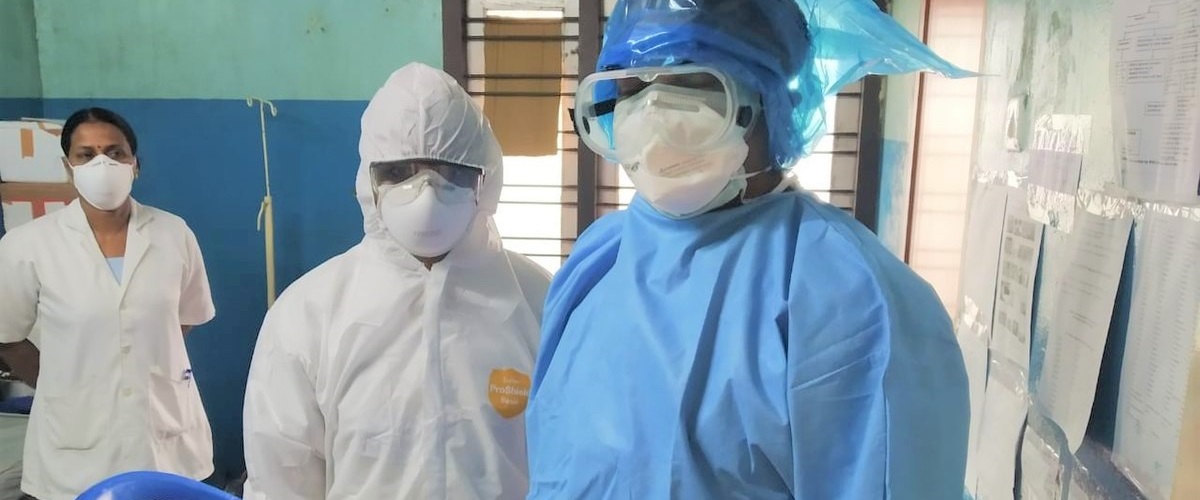
Reflections on public health system responses during Covid-19 in low-and middle-income countries
This event has now finished.
Event details
Strong, resilient health systems are effective bulwarks against shocks, but the COVID-19 pandemic has revealed the existing and diverse nature of weaknesses of health systems across the world, especially in low-and-middle-income countries (LMIC).
The pandemic has fuelled unprecedented demand for healthcare which has strained and overstretched health systems and resources by overburdening both their services and healthcare workers. There has been noted concern about the risk of the diversion of resources into emergency response as this often at the cost of other essential services and health care programmes. This would lead to any progress in key health outcomes for some of the world’s poorest and most vulnerable populations being derailed.
How health systems can balance between the new challenges and persisting priorities would determine how likely are countries in continued global health and development commitments, such as the achieving the SDGs and ensuring Universal Health Coverage (UHC).
Experience and learning insights from the public health system leaders in LMICs, such as managing and responding to the pandemic in diverse contexts, would be critical to recognise and prioritise the future agenda in global health initiatives. This can inform developing roadmaps for shock-proofing health systems and ‘build them better’.
This webinar aims to synthesise perspectives from experts in academia on key lessons learnt by the health systems in LMICs in responding to the present pandemic.
Our speakers will be sharing insights and experiences on measures that could contribute, or have been successful, to protect and respond to different health system constraints and challenges in different country contexts. Strategies that would help health systems in ‘building back better’ make them resilient against similar future shocks, and the resource needs commensurate to such responses will also be discussed.
- Achin Chakraborty is a Professor of Economics and currently the Director of the Institute of Development Studies Kolkata (idsk.edu.in). He has research interests in development economics, especially the economics of the social sector, and the political economy of India. He received a PhD in Economics from the University of California at Riverside, USA. He was a visiting professor at Sciences Po, Paris, and was a CICOPS Fellow at the University of Pavia, Italy. Achin is published widely in such journals as Economic Theory, BMJ Global Health, Social Indicators Research, Economics Bulletin, Journal of Quantitative Economics, Environment and Development Economics. He co-edited with Anthony D’Costa two recently published books – The Land Question in India: State, Dispossession and Capitalist Transition (OUP, 2017) and Changing Contexts and Shifting Roles of the Indian State (Springer, 2019). He has jointly authored the book Limits of Bargaining: Capital, Labour, and the State in Contemporary India (CUP, 2019).
- Dr Daniel Maceira is an Argentine citizen, Ph.D. in Economics from Boston University. He is a Senior Researcher at the Center for the Study of State and Society (CEDES), Independent Researcher of the National Council of Scientific and Technological Research (CONICET), Director of the Health Policy Department at Foundation for the Argentine Development (FUNDAR), and Professor at the Economic Department, National University of Buenos Aires (UBA), Argentina. Executive Board Member of Health Systems Global holding the chair for The Americas until October 2024.
- Dr Weeam Hammoudeh is an Assistant Professor at the Institute of Community and Public Health. She holds a PhD and MA in Sociology from Brown University and an MPH from Birzeit University. She has an academic interest in understanding how political and social transformations impact health, psychosocial wellbeing, and population processes, particularly in conflict areas; as well as how health systems and social institutions develop and shift in relation to political, economic, and structural factors.
Chair
- Dr Papiya Mazumdar is a geographer and population scientist for the Department of Health, at the University of York. Her research focuses on environmental linkages to population health. Her work has spanned across health system responses to natural disasters and other concerns, including socioeconomic vulnerabilities of populations, in Low-and-Middle-Income Countries. Currently, she is Research Fellow with the Mental Health and Addiction Research Group (MHARG), Dept. of Health Sciences, University of York, working on different aspects of mental health in South Asia.
Image (adapted): Healthcare workers wearing personal protective equipment while caring for patients with coronavirus infection in the Indian state of Kerala by Victoria Pickering (CC0 1.0)
Please note that this webinar will be delivered using Zoom Webinar facility. No prior purchasing of software is necessary but registration is required. While the event may be recorded we will not record your voice or image. Please note that during the session, your name and email address (as entered at the registration stage) may be visible to other participants. If you have any questions, please contact igdc@york.ac.uk.
Venue details
Wheelchair accessible
No hearing loop
